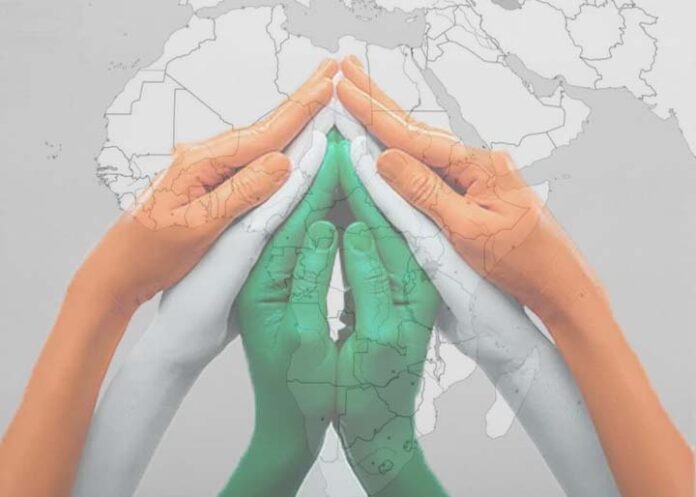In an increasingly turbulent and unstable global landscape, India has distinguished itself as a formidable power capable of deftly navigating the complex and often chaotic international order. The past five years have served as a litmus test for India’s diplomatic acumen, as the world has been beset by relentless challenges. Beginning with the COVID-19 pandemic in 2019-2020, these global challenges have only compounded, with the onset of the Russia-Ukraine war and the Israel-Hamas conflict. The recent unrest in Bangladesh is merely the latest addition to the growing list of international crises.
In this polarised world, India stands out as a nation that has persistently pursued inclusivity in its foreign relations. To exemplify this, one can look at India’s engagement with Africa and how inclusivity has become a hallmark of the India-Africa partnership.
India’s Enduring Ties with Africa
India’s relationship with Africa spans several centuries and is deeply rooted in history. Building upon these historical connections, India has diversified its engagements with African nations in modern times. Today, these relations extend across a broad spectrum, encompassing culture, education, trade, technical cooperation, strategic collaboration, and capacity building. India’s reputation and goodwill in the continent have elevated it to the position of a major partner for Africa on the global stage.
Africa, endowed with abundant natural resources, a favourable demographic profile, and a strategic geographical location, has attracted the interest of numerous global powers, including the United States, China, Russia, and European countries. However, for many of these nations, Africa has primarily been a theatre for geopolitical and economic competition. In contrast, India’s approach to Africa reflects an effort to increase the continent’s stake in the international order.
India has steadily expanded its footprint in Africa, with trade between the two regions reaching $103 billion in 2023. India now stands as the third-largest trading partner of African nations, following the European Union and China. On the strategic front, India has consistently contributed to security in Africa through peacekeeping missions. Moreover, India and Africa are engaged in the India-Africa Defence Dialogue, wherein both sides collaborate on various fronts, including joint military exercises, training, maritime security, joint defence production, and defence exports from India to African countries.
India’s strategic partnership with Africa is rooted in shared history and forward-looking cooperation. From economic collaboration to security engagements, India has become a crucial ally in expanding Africa’s global influence
The Inclusivity Factor
India’s commitment to Africa is underscored by a focus on inclusivity that transcends mere bilateral relations. Two key aspects highlight the inclusivity factor in India-Africa ties.
Firstly, India has proactively sought to ensure the participation of African countries in prominent global forums. This is in line with India’s longstanding concern about the representational gaps in the United Nations (UN). Dr S Jaishankar, India’s External Affairs Minister, has been vocal about the need to reform the UN, warning that the continued neglect of countries from Africa, Latin America, and the Pacific Islands could render the organisation irrelevant.
India has backed this stance with concrete actions, notably by advocating for the inclusion of African nations in two major international organisations. In 2023, during its presidency of the G20, India spearheaded the admission of the African Union as a member of this prestigious group. The G20, comprising 20 of the world’s largest developed and developing economies, was originally formed to foster a resilient global economy. However, it was paradoxical that the African Union—an organisation representing 54 countries with a combined population of over 1 billion and a GDP of $3.1 trillion in 2023—remained outside this framework. Thanks to India’s efforts, the African Union, with its dynamic economies, is now an integral part of the G20.
Another instance of India supporting African representation in a multilateral organisation is the recent expansion of BRICS (Brazil, Russia, India, China, and South Africa). Originally formed in 2006 as BRIC, the group aimed to represent the world’s leading developing and emerging economies. South Africa joined the group in 2010, transforming it into BRICS. In 2023, BRICS initiated an expansion process, welcoming five new members, including two African countries. The new BRICS members—Egypt, Ethiopia, Saudi Arabia, the UAE, and Iran—add significant weight to the organisation. Although smaller in size compared to the G20, BRICS commands considerable influence, with a combined GDP of $28 trillion, constituting approximately 28 per cent of the global economy. The expanded BRICS now represents 45 per cent of the world’s population, and with the inclusion of Egypt and Ethiopia, African countries now make up 30 per cent of BRICS membership. This expansion not only broadens BRICS’ geostrategic reach but also shifts the economic centre of gravity towards the Global South.
India’s advocacy for African inclusion in global organisations marks a new era in international diplomacy. By driving the inclusion of the African Union in the G20 and expanding BRICS, India is helping reshape the global order with Africa at its heart
Secondly, India has made concerted efforts to address the spill-over effects of geopolitical conflicts on the Global South. The Russia-Ukraine war, for instance, has disrupted supply chains across various regions, with Africa being one of the hardest-hit areas, particularly in terms of food grain imports. Before the war, at least 15 African countries sourced 50 per cent of their total wheat imports from Ukraine. The conflict exacerbated food insecurity on the continent, triggering a cascade of crises, including conflict-induced famines and declining agricultural productivity. In response, India has actively collaborated with Africa on food security issues, making this a central theme of the India-Africa summits. The recently held 32nd International Conference on Agricultural Economists in New Delhi, where the India-Africa partnership on food security was a focal point, is a testament to this collaboration. India is increasingly becoming Africa’s preferred partner for investment in the agricultural sector, offering training programmes for African agricultural professionals and other capacity-building initiatives. Additionally, with the African Union’s inclusion in the G20, India has secured another platform to address food security challenges in the Global South.
Since gaining independence, India has evolved through various stages—from being labelled a Third World Country to being recognised as a Developing Country and, more recently, as a key player in the Global South. These categories, by their very nature, have often been divisive, underscoring the disparity between rich and poor nations. However, India has managed to transcend these labels, emerging as the world’s fifth-largest economy. Leveraging its economic clout, India has positioned itself as a bridge between the developed and developing worlds. As one of the largest economies, India is using its influence to magnify the voices of Global South countries, ensuring their equitable representation and participation in global affairs.
As India ascends to a prominent position in the world order, it remains committed to ensuring that inclusivity is the cornerstone of its rise.
The writer is an Independent Political Analyst and Researcher based in Vadodara. Follow him on X: @NiranjanMarjani. The views expressed are of the writer and do not necessarily reflect the views of Raksha Anirveda
–The writer is an Independent Political Analyst and Researcher based in Vadodara. Follow him on Twitter: @NiranjanMarjani. The views expressed are of the writer and do not necessarily reflect the views of Raksha Anirveda







